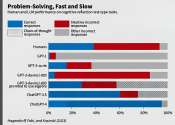Just like your brain, ChatGPT solves problems better when it slows down
When presented with a problem, your brain has two ways to proceed: quickly and intuitively or slowly and methodically. These two types of processing are known as System 1 and System 2, or as the Nobel Prize-winning psychologist ...
Oct 31, 2023
0
428









